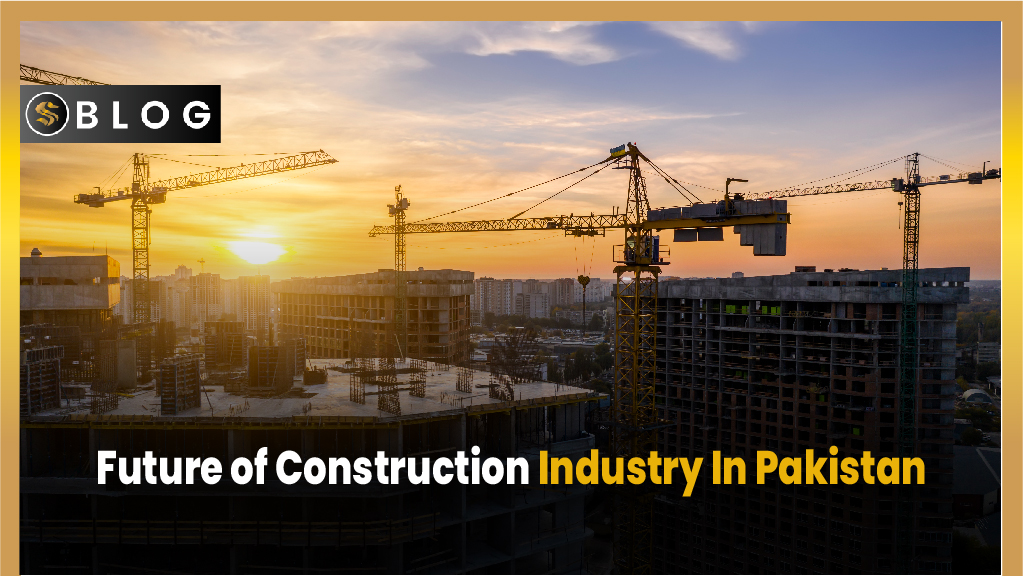
Share This Story, Choose Your Platform!
The Future of the Construction Industry in Pakistan: Trends and Prospects
The construction industry in Pakistan is on the brink of a transformative era. With rapid urbanization, increasing demand for housing, and the government’s focus on infrastructure development, the sector is poised for significant growth. However, like any industry, the future of construction in Pakistan is influenced by various factors, including technological advancements, economic conditions, and policy changes. This blog explores the trends shaping the future of the construction industry in Pakistan and the opportunities they present.
Technological Advancements and Innovation
One of the most significant factors driving the future of construction in Pakistan is the adoption of new technologies. Building Information Modelling (BIM), 3D printing, and prefabrication are becoming more prevalent, offering faster, more efficient, and cost-effective construction solutions. These technologies are not only reducing the time required for construction projects but also improving the quality and sustainability of buildings.
For instance, BIM allows for the creation of detailed 3D models that provide insights into the planning, design, and management of construction projects. This technology helps in reducing errors, minimizing waste, and optimizing resource use. Similarly, 3D printing is revolutionizing the way structures are built, enabling the rapid production of building components with high precision.
You May Also Read
Experience the Best Quality Construction in Islamabad: A Deep Dive into Opal Mall & Luxury Suites
Sustainable Practices in The Construction Industry in Pakistan
As global awareness of environmental issues grows, sustainable construction practices are becoming increasingly important. In Pakistan, there is a growing emphasis on green buildings that minimize environmental impact. This includes the use of eco-friendly materials, energy-efficient designs, and waste reduction practices.
Sustainable construction is not just about being environmentally friendly; it also offers long-term economic benefits. Energy-efficient buildings reduce operating costs, while the use of durable materials extends the lifespan of structures. As Pakistan faces challenges related to climate change, adopting sustainable construction practices will be crucial in ensuring a resilient built environment.
Urbanization and Housing Demand
Pakistan’s urban population is expected to continue growing rapidly, leading to increased demand for housing and urban infrastructure. According to the United Nations, nearly 50% of Pakistan’s population will live in urban areas by 2050. This trend is driving the need for more residential developments, commercial spaces, and public infrastructure.
To meet this demand, the construction industry will need to innovate in terms of design and construction techniques. High-rise buildings, mixed-use developments, and smart cities are likely to become more common as cities expand and new urban areas are developed. The government’s Naya Pakistan Housing Scheme, which aims to build five million affordable homes, is an example of initiatives that will drive growth in the housing sector.
Government Policies and Investment
The future of the construction industry in Pakistan is also heavily influenced by government policies and investment. The government’s focus on infrastructure development, including roads, bridges, and energy projects, is expected to boost the construction sector. Initiatives like the China-Pakistan Economic Corridor (CPEC) are already bringing significant investment into the country, creating opportunities for growth.
Moreover, the government’s pro-business policies, such as tax incentives for real estate developers and construction companies, are encouraging investment in the sector. These policies are expected to attract both local and international investors, further stimulating growth in the construction industry.
Challenges and Opportunities
While the future of the construction industry in Pakistan is promising, it is not without challenges. Economic instability, fluctuating material costs, and a shortage of skilled labor are some of the hurdles the industry faces. However, these challenges also present opportunities for innovation and improvement.
For example, the adoption of modern construction techniques can help mitigate the impact of labor shortages and reduce reliance on traditional methods. Similarly, the development of local manufacturing industries for construction materials can help stabilize costs and reduce dependency on imports.
Sapphire Builders: Leading the Way
In the midst of these evolving trends, Sapphire Builders and Associates stand out as a beacon of innovation and quality in Pakistan’s construction industry. With a strong focus on modern design, sustainability, and customer satisfaction, Sapphire Builders have consistently delivered projects that set new benchmarks in the industry.
Their flagship project, Opal Mall & Luxury Suites, is a prime example of their commitment to excellence. Located in the heart of Bahria Town, Islamabad, Opal Mall is a blend of luxury, functionality, and eco-friendly design. It represents the future of urban living in Pakistan, offering residents and businesses a space that is both modern and sustainable.
Sapphire Builders’ vision goes beyond constructing buildings; they are dedicated to creating communities that thrive. By integrating cutting-edge technology with traditional values, they are not only shaping the future of the construction industry but also contributing to the growth and development of Pakistan.
Conclusion
The future of the construction industry in Pakistan is bright, with numerous opportunities for growth and innovation. As the country continues to urbanize and the demand for housing and infrastructure rises, the construction sector will play a crucial role in shaping the nation’s future. With companies like Sapphire Builders leading the charge, the industry is set to reach new heights, delivering projects that are not only architecturally stunning but also sustainable and economically viable.
To learn more Visit our website:
www.sapphireassociate.com
info@sapphireassociate.com
UAN +92 347 9043333




